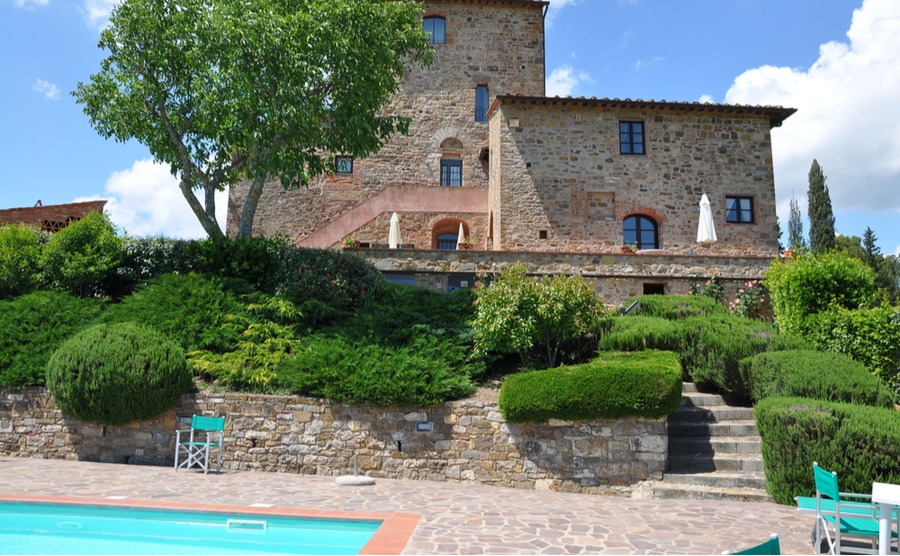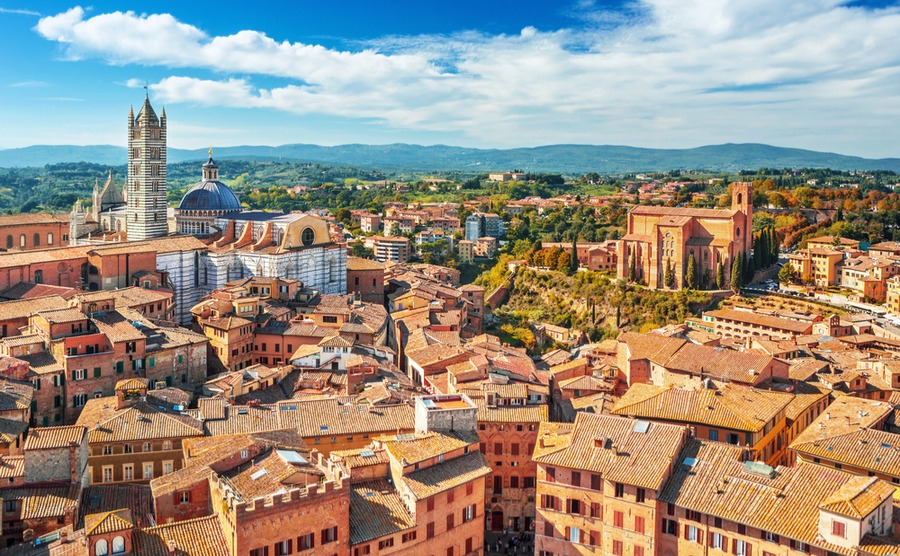Renting out your Italian property
If you’re planning to rent out your Italian property, you’re not alone. Italy is one of Europe’s top 5 countries for holiday rentals. It’s simple to advertise your home to potential guests through websites such as Airbnb and HomeAway, where you can manage your bookings, safely be contacted by potential guests and receive payments.
Tourists are increasingly opting for holiday destinations that are ‘authentic’ and offer ‘local’ experiences related to the host country’s traditions, such as food and art. Italy lends itself well to this shift towards holidays related to interests, bucket list locations and new authentic experiences. Holiday rental properties in “Art Cities”, such as Turin, Milan, Venice, Bologna, Ferrara, Florence, Perugia, Rome, Naples, and Palermo are in great demand by art and history loving tourists and can attract high rental rates.
For the adventurous tourist there are plenty of mountains, country parks, rural scenery and beautiful coastlines to explore. Countryside properties are very popular with British house buyers as they tend to be very reasonably priced. In the right location, they can also give a good holiday rental return over the summer months.
Finding the perfect rental property
If you are hoping to buy a property that you can rent to guests for a few weeks a year, there are several things to consider to give you the best chance of getting a good return. Distances to airports and good road and rail links are key. Fortunately, Italy has very good transport links with 11 major airports and 20 smaller airports dotted across the country. The train and road networks are also very good. As Italy is easily reached from many countries, your potential rental guests could come from across the world.
An Italian rental home can be a great investment. For innovative ideas on raising the money to buy it, read How to Pay for an Italian Property.
You should also look at what places of interest are in the area. Italy has 54 UNESCO World heritage sites, the highest number in the world, so there is plenty to see, and even the smallest villages have charming festivals and historic centres. Ski slopes, beaches and historic sites are another big draw.

A sparkling pool in the foreground and a blue sky will always attract rentals!
Maintaining your home
Appearance is very important when you rent out your Italian property. It should be photogenic enough that when someone is searching through pages of photographs of holiday rentals, they will be drawn to click on yours. Traditional Italian buildings, swimming pools and views can be a big plus. Word-of-mouth recommendations and good online reviews are an essential way to get further customers.
Your property must be is up to the standard expected by holiday rental guests right from the start, or you risk starting off with bad reviews and wrecking your rating. You’ll need to furnish your home with clean, stylish, yet sturdy furniture and modern equipment.
Word-of-mouth recommendations and good online reviews are an essential way to get further customers
Consider also external help when you rent out your Italian property. If you are unable to be there to clean it yourself, make sure there is a trustworthy person in the area that you can employ to do cleaning and maintenance. You will also need someone to meet the guests and hand over keys. They will need to be on call if the guests have any problems that need sorting out immediately. Typical problems include gas or water supply running out and power cuts. In rural areas, finding a reliable person willing to manage your property may be more difficult than in a tourist town.
Tax if you rent out your Italian property
Any income arising from ownership of a property located in Italy and earned by a resident or non-resident is taxable in Italy. If you own and manage more than one property used for tourist accommodation, a VAT number may also be necessary, along with extra paperwork requiring the use of an Italian accountant.
If you need legal advice, your Italy property specialists in the Resource Centre can put you in touch with a trusted, English-speaking lawyer.
There has been a high level of tax evasion in the Italian short-term rental market. The authorities previously largely overlooked this. More recently, the government has been trying to crack down on this, particularly those holiday rental owners making big money and creating unfair competition to hotels. They introduced new legislation in June 2017 to deal with the difficulty of collecting short let taxation (Regime fiscale delle locazioni brevi). It is aimed at informal B&Bs and the private individual who lets their residential property by getting customers through online portals.
Cedolare secca system
Online short let income is now taxable under the “Cedolare secca” system. In theory, this method should make paying tax on this income easier and cheaper for the homeowner. Web portals that accept customer payments on behalf of hosts now take the 21% tax due and pass it on to the Italian Revenue Agency on the homeowner’s behalf. But, if the guest does not pay directly, then the responsibility to pay the taxes remains with you. As such, you will need to seek assistance from an Italian accountant. Italian income tax currently stands at 23% on earnings under €15,000 and 27% on income between €15,001 and €28,000.
Despite the new legislation, there is still wide-scale tax evasion. The Minister for Tourism is considering the introduction of identification codes for each accommodation facility. If introduced, you’ll have to display this on your advertisement, to show compliance with your legal obligations.

When you rent out your Italian property, make sure to double-check your local area’s tourist tax.
Commercial business
If you offer more than three holiday properties or your property is permanently up for rent, the state will automatically assume that you are letting property on a professional scale. As a commercial business, you will have to register with the local authority, as well as the chamber of commerce. You will also need to get professional local advice to ensure your business and property meet all requirements, like structural safety regulations. You’ll also have to charge VAT. If a property is rented for more than 30 days, you must register the contract at the local tax office.
Registering guests and tourist tax
Each local authority has its own regulations concerning holiday rentals. In some cities, you have to inform them of the arrival of each guest and send a monthly list of all your guests. You must send the tourist tax (“tassa di soggiorno”) to the local authority and/or province, by bank transfer. The responsibility for these registrations and taxes falls on the property owner. Introduced back in 2011, the tourist tax is at the discretion of each local authority. Italian tourist cities that currently charge a tourist tax are: Milan, Rome, Florence, Naples, Turin, Venice, Todi, Assisi, Pompeii and Paestum. Other towns expected to follow suit are Portofino, Rapallo and Santa Margherita Ligure.
Each local authority has its own regulations concerning concerning tourist taxes, so do double-check.
The Italian municipalities are entitled to apply this tourist tax on stays in hotels, bed & breakfasts, holiday homes, cottages, campsites and other holiday accommodation. The amount of the tax ranges from €1 to €5 per day per person. This depends on the type and “luxury level” of the facility. For a typical Airbnb property rental in Rome, you’ll be paying €3.50 per day per person.
Insurance
If your rent out your Italian property, it is wise to take out insurance. That way, you can sort any problems quickly and easily. Flood damage, theft of your TV etc. are things that will need sorting out quickly before your next guests arrive. A good holiday home insurance policy should include public liability insurance, and cover your property when it’s not occupied. I’d advise getting cover for loss of rent or income.
A rental property is the perfect option for a holiday home to share, so why not pool finances and buy with family or friends? Explore our guide, Buying Abroad with Family.
If you are just going to rent your holiday home to a few friends and ex work colleagues you have little to worry about. Holiday rental websites are also very easy to use and provide step by step instructions and advice. However, if you are going to be looking to make a big income, you will need to make sure that you check with the local authorities and a local accountant to be certain you are all above board.
Should you employ the services of a property agent?
If you are only letting out a part of your property, or will be around when your guests are there, you may opt to manage all of the logistics yourself. Should you be renting the property for prolonged periods while you are back in the UK, it could be wise to employ the services of a property management company. For an annual fee, usually starting at around €500, or a percentage of rental income, they will take care of advertising your property, collecting payment, greeting guests, cleaning the property, and garden and pool maintenance.
Get set to rent out your Italian property?
If you’re yet to purchase a property to rent out, make sure to download your Italy Buying Guide below. It has all the information you need about purchasing in Italy gathered in one place. And, if you have any questions, don’t hesitate to call your Italy property specialists in the Resource Centre on 020 7898 0549 or email [email protected].


